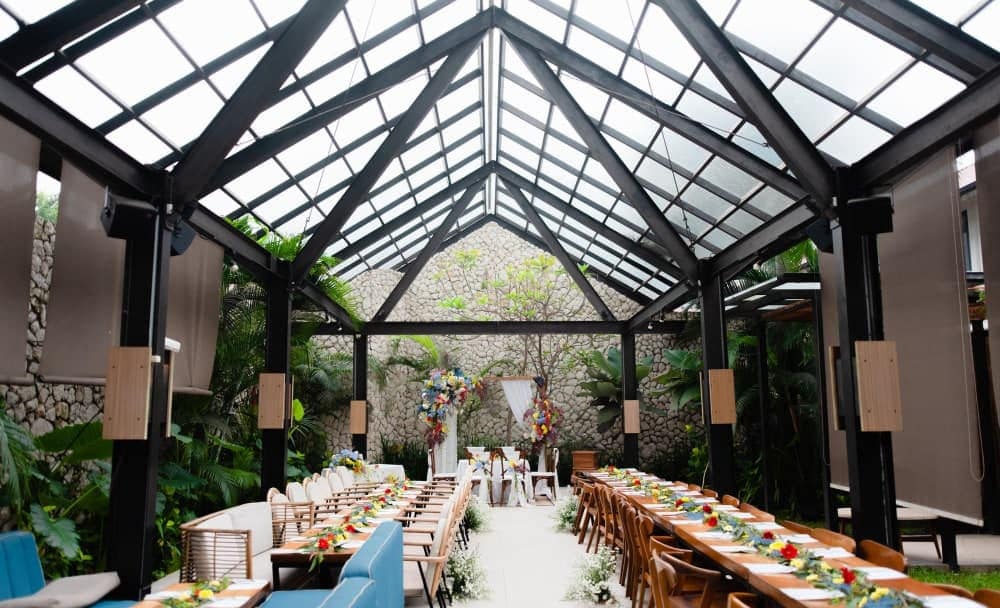
Venue Pricing: Essential Guide for Renting Out Spaces for Events
Are you a venue manager eager to demystify the process of event venue pricing? In this comprehensive guide, we delve deep into the world of venue prices to equip you with the knowledge and strategies needed for success. Discover the factors influencing venue pricing, explore different event space pricing models, and master negotiation techniques to set competitive prices that attract clients and enhance your bottom line. Plus, learn how Timely's solutions can streamline your venue management process for greater efficiency and profitability.
I. Factors Influencing Venue Pricing
Venue pricing is influenced by a variety of factors that can vary from one location to another. Let's take a closer look at some of the key factors that venue managers need to consider when setting their prices.
- Location: A venue's geographic location significantly impacts event venue prices. Sought-after areas command higher rates due to increased demand and accessibility. Consider proximity to city centres, transportation hubs, and popular attractions.
- Facilities and Amenities: The facilities’ offerings significantly impact party venue prices. State-of-the-art technology, luxurious accommodations, versatile event spaces, and premium amenities like catering services or audiovisual equipment justify higher rates.
- Capacity: The size and capacity of your venue affect event venue pricing. Larger venues accommodating more guests may charge higher rates due to their ability to host larger events, conferences, or weddings.
- Seasonality: Seasonal fluctuations can impact event space pricing. High-demand seasons, such as peak wedding or holiday seasons, may warrant higher prices, while off-peak seasons may require discounted rates or special promotions to attract bookings.
- Reputation and Demand: Established venues with positive reviews and a strong track record can command higher conference venue prices due to perceived value and popularity.
Understanding these factors is essential for venue managers to make informed pricing decisions that align with their business goals and market conditions. By taking into account these considerations, you can ensure that your venue is priced competitively and attractively to potential clients.

II. Understanding Different Venue Pricing Models
When it comes to pricing your venue, there are several pricing models to choose from. Each model has its own advantages and considerations, so let's explore some of the most common ones.
- Flat Rate Pricing: Charging a fixed rate regardless of event type or duration simplifies venue pricing for both venue managers and clients. However, it may not account for variations in demand or event-specific needs.
- Hourly or Daily Rates: Ideal for workshops, seminars, or short meetings, hourly or daily rates allow for flexible event space price lists based on shorter durations.
- Tiered Pricing: Tiered pricing involves offering different pricing tiers based on factors such as event size, duration, or additional services required. This model allows venues to cater to a wider range of clients and budgets. By offering different packages, venues can attract clients with varying needs and budgets.
- Revenue Sharing: Revenue sharing is a model where the venue receives a percentage of the event's total revenue instead of charging a fixed fee. This model can be beneficial for venues that have the potential to attract high-revenue events. However, it requires careful negotiation and monitoring to ensure fair compensation for both parties.
Choosing the right pricing model depends on various factors, including the type of events you host, your target audience, and your business objectives. Consider the unique aspects of your venue and the needs of your clients to determine which pricing model aligns best with your goals.
III. Venue Pricing Strategies for Maximizing Revenue
Setting the right price for your venue is crucial for maximizing revenue and profitability. Here are some pricing strategies that can help you achieve this goal.
- Dynamic Pricing: Dynamic pricing involves adjusting prices in real-time based on factors such as demand, availability, and seasonality. By implementing dynamic pricing, venues can maximize revenue by charging higher prices during peak periods and lowering prices during off-peak times to attract bookings.
- Value-Based Pricing: Pricing the venue based on the perceived value it offers to clients emphasizes the unique features, services, and amenities provided. Highlighting the value proposition of the venue can help justify higher event space prices and attract clients prioritizing quality and experience.
- Bundling and Upselling: Bundling additional services or amenities with the venue rental increases the perceived value and justifies higher event space prices. Packages including catering, audiovisual equipment, or event planning services provide clients with a convenient and all-inclusive experience.
- Early Bird and Last-Minute Discounts: Offering early bird discounts for clients who book well in advance can incentivize early bookings and secure revenue. On the other hand, last-minute discounts can help fill empty slots and generate revenue during slower periods.
By implementing these pricing strategies, venue managers can optimize revenue and ensure that their pricing aligns with market demand and client expectations.
IV. Conducting Market Research to Determine Competitive Event Space Prices
To set competitive prices for your venue, it's essential to conduct market research. Also, to analyze the pricing strategies of your competitors. Here are some steps you can take to gather valuable insights:
- Identify Competitors: Identify venues offering similar services and catering to the same target audience to understand the competitive landscape for event venue pricing.
- Analyze Pricing Structures: Study competitors' pricing structures, including base prices, additional fees, and any discounts or promotions, to identify trends and event space price patterns.
- Compare Amenities and Services: Evaluate competitors' facilities, amenities, and services to determine how they compare to your offerings and whether their pricing is justified by the value provided. Consider factors like technology, catering options, and on-site staff availability when comparing event venue prices and party venues prices.
- Survey Potential Clients: Conduct surveys or interviews with potential clients to gather insights into their pricing expectations, budget limitations, and perception of value to align your event space pricing strategy accordingly.
By conducting thorough market research, you can gain a better understanding of the competitive landscape. Therefore, you can ensure that your venue is priced competitively to attract bookings and maximize revenue.

V. Negotiating and Setting Pricing for Events and Bookings
Negotiating and setting pricing for venues requires effective communication and understanding of your clients' needs. Here are some tips to help you navigate the negotiation process and set venue prices that work for both parties.
- Understand Client Requirements: Take the time to understand your client's specific requirements. Furthermore, including the type of event, duration, expected attendance, and any additional services they may need. This understanding will allow you to tailor your pricing proposal to their needs.
- Highlight Unique Selling Points: Emphasize the unique selling points of your venue and the value it offers to clients. This can help justify higher prices and differentiate your venue from competitors.
- Be Flexible: While it's important to have a pricing structure in place, be open to negotiation. Additionally, consider customizing packages or services to meet your clients' budget constraints. Offering flexible venue pricing options can help you secure bookings that may have otherwise been lost.
- Provide Transparency: Clearly communicate all pricing details, including any additional fees or charges, to your clients. Transparency builds trust and ensures that there are no surprises or misunderstandings down the line.
By adopting these negotiation strategies, you can establish mutually beneficial pricing agreements that meet your clients' needs while maintaining profitability for your venue.
VI. Tips for Effectively Communicating Venue Pricing to Potential Clients
Communicating event venue pricing to potential clients is an essential part of the booking and rental process. Here are some tips to help you effectively convey your venue pricing information and address client concerns:
- Create Clear Pricing Structures: Present your pricing in a clear and concise manner, using easy-to-understand terms and formats. Avoid ambiguity by breaking down costs and explaining what each pricing tier or package includes for event space rentals. Consider offering a downloadable event space price list for client convenience.
- Showcase Value: Highlight the value and benefits that clients can expect to receive when booking your venue. Emphasize the unique features, amenities, and services that set your venue apart and justify the pricing.
- Provide Visuals: Utilize visuals such as photos, videos, or virtual tours to showcase your venue. This will help potential clients envision their event taking place in your space. Visuals can be powerful tools for conveying the quality and ambiance of your venue.
- Offer Personalized Consultations: Allow potential clients to schedule personalized consultations. Where they can discuss their specific needs, preferences, and budget constraints for their event space rental. This personalized approach builds trust and confidence in your venue and pricing strategy. Further allowing you to address their concerns regarding how to price event space.
By effectively communicating party venue pricing information, you can address client concerns. Therefore building trust, and increasing the likelihood of securing bookings.

VII. Managing Customer Expectations Regarding Pricing
Managing customer expectations regarding pricing is essential to avoid misunderstandings or disappointment. Here are some strategies to help you set realistic expectations and ensure a positive client experience:
- Provide Detailed Information: Clearly outline all venue pricing details and any additional fees or charges upfront. Avoid surprises or hidden costs by providing comprehensive information about what is included and what is not.
- Set Realistic Expectations: Be transparent about the limitations of your venue and any restrictions that may impact pricing. Communicate any capacity constraints, noise restrictions, or other factors that may affect the client's event.
- Offer Alternatives: If a client's budget doesn't align with your standard pricing, consider offering alternative options or packages. This flexibility can help you retain clients who may otherwise have been lost due to budget constraints.
- Provide Exceptional Service: Delivering exceptional service and exceeding client expectations can help justify your venue prices. As well as leave a lasting positive impression. Aim to provide a seamless and memorable experience for every client, regardless of their budget.
By managing customer expectations and delivering on your promises, you can build a strong reputation and increase customer satisfaction. Therefore, leading to repeat bookings and positive referrals.
VIII. Analyzing and Adjusting Venue Pricing Based on Performance
Regularly analyzing and adjusting your venue pricing based on performance is essential to stay competitive and maximize revenue. Here are some steps you can take to evaluate your pricing strategies and make necessary adjustments.
- Collect and Analyze Data: Gather data on bookings, revenue, and customer feedback. Use it to assess pricing strategies' effectiveness for event space rentals. Identify patterns or trends in client behavior related to pricing to inform adjustments.
- Monitor Competition: Stay informed about competitors' pricing strategies and market conditions to adapt your event space pricing decisions accordingly. Keep an eye on how competitors adjust their conference venue prices or party venues prices based on seasonality or trends.
- Conduct Surveys or Interviews: Regularly survey your clients to gather feedback on their satisfaction with your pricing. Further gathering insights into their perception of value. This feedback can help you identify areas where adjustments may be needed.
- Test and Experiment: Experiment with different pricing strategies or offers on a small scale. I that way you can gauge customer response and measure the impact on revenue for event space rentals. Use experimentation to inform future pricing decisions.
By regularly assessing and adjusting your pricing strategies, you can ensure that your venue remains competitive. As well as aligned with market demand, maximizing revenue and profitability.

IX. Conclusion: Key Takeaways for Venue Pricing
Pricing your venue effectively is essential for attracting event inquiries, closing bookings, and maximizing revenue. Factors such as location, facilities, capacity, seasonality, and demand play significant roles in determining event venue pricing. Understanding different pricing models and strategies, conducting market research, and effectively communicating pricing information are crucial aspects of successful venue pricing. Negotiating pricing agreements, managing customer expectations, and analyzing and adjusting pricing based on performance are also essential for long-term success.
With Timely's venue management solutions, venue managers can streamline operations, enhance customer experience, and achieve their business goals effectively. Timely offers a comprehensive suite of tools and features designed specifically for venue management. This includes space scheduling and management, free and paid booking and reservations, automated emails, and reporting and analytics. Start applying these strategies today to propel your venue to success with Timely by your side.






